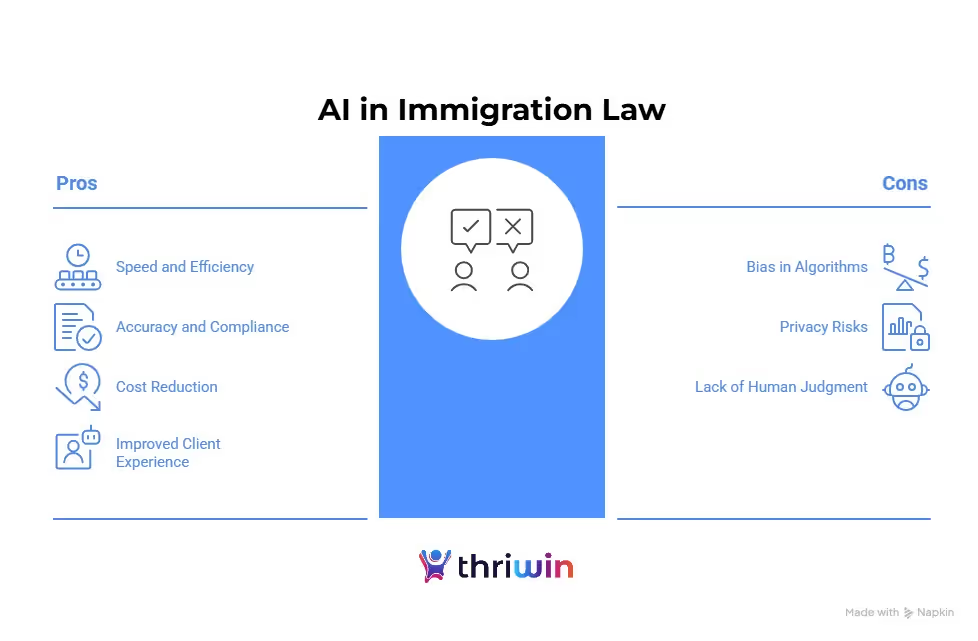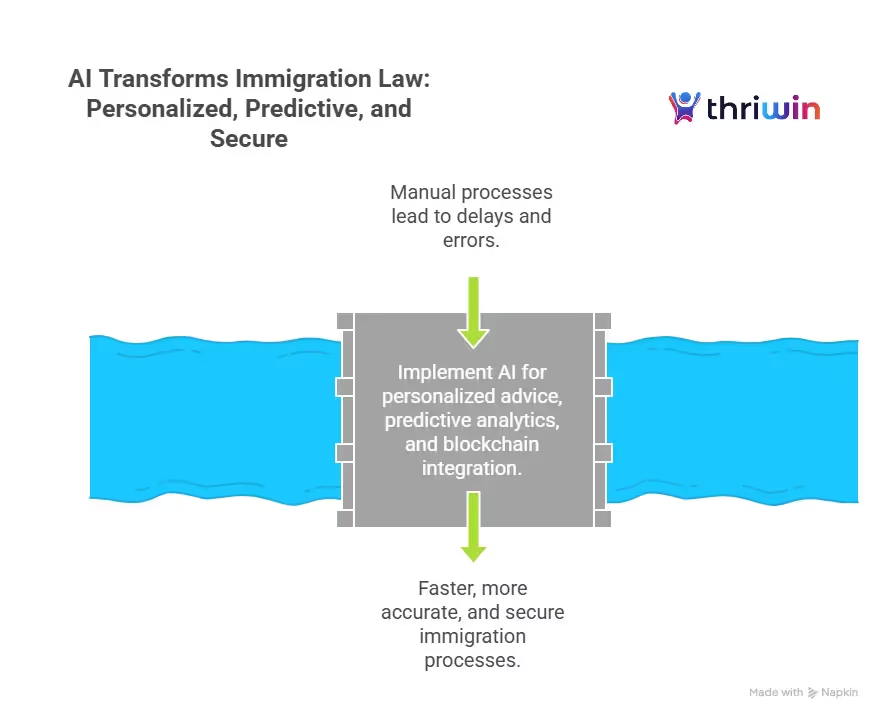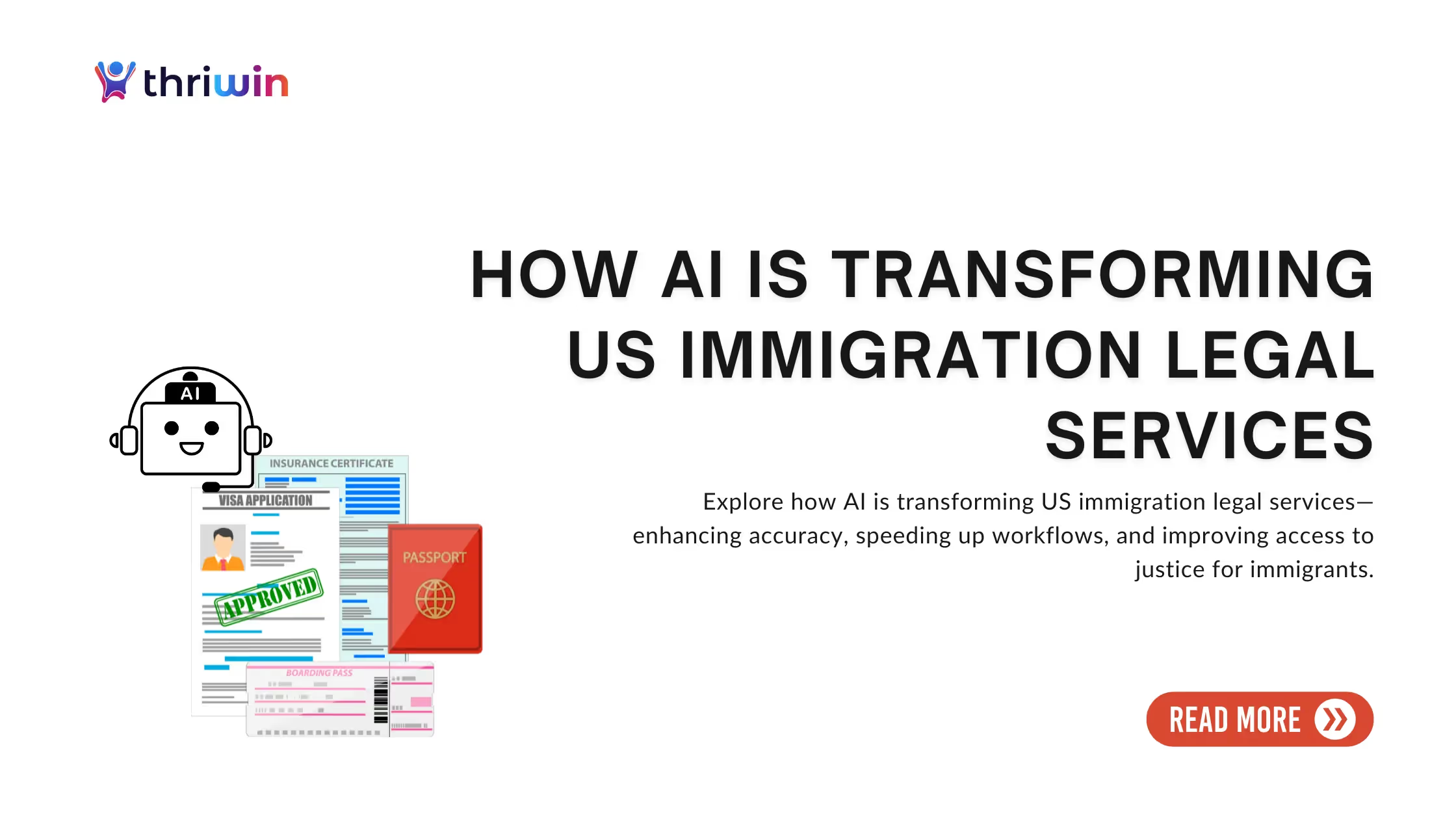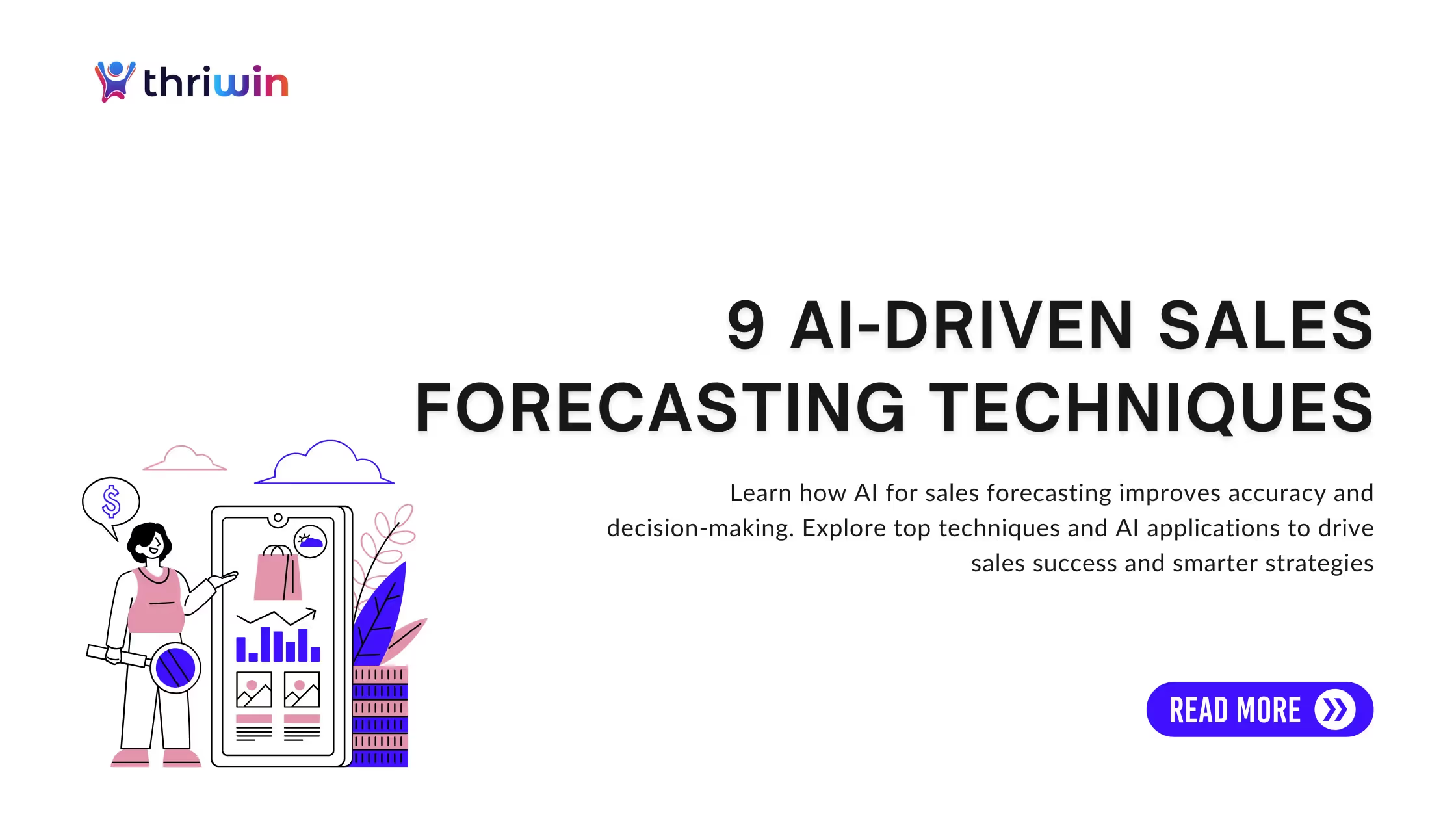Artificial Intelligence (AI) is redefining the legal services landscape across the United States, particularly in immigration law. From automating tedious paperwork to offering real-time updates on visa processing, AI-powered tools are becoming invaluable assets for law firms, clients, and immigration officials. With immigration policies and documentation processes notoriously complex, AI offers a much-needed revolution, streamlining operations, reducing human error, and ultimately improving outcomes for legal practitioners and individuals they serve.
This article explores the multifaceted impact of AI on US immigration legal services, detailing its benefits, limitations, ethical implications, and future potential.
Why the Legal Immigration Sector Needs AI
The legal immigration landscape in the US is growing more complex each year. Rising caseloads, evolving regulations, and administrative bottlenecks push law firms and government agencies to adopt innovative solutions. AI is no longer a luxury—it’s quickly becoming necessary for legal professionals aiming to stay accurate, agile, and client-focused.
- The Burden of Manual Processes
Immigration law is document-heavy and time-sensitive. Attorneys often spend countless hours reviewing visa applications, managing compliance, and tracking changes in immigration policies. Traditional processes not only consume time but are also vulnerable to human error.
- The Demand for Greater Efficiency
As immigration caseloads grow, law firms face increasing pressure to deliver faster services without compromising quality. AI tools have the potential to bridge this gap by automating repetitive tasks, analyzing extensive datasets, and facilitating faster decision-making processes.
- Constant Policy Changes and Legal Complexity
US immigration law is notorious for its frequent updates, memos, and executive orders. Staying on top of policy changes manually is inefficient and risky. AI platforms equipped with real-time data tracking ensure attorneys never miss crucial changes.
- Rising Client Expectations for Transparency
Immigrants today expect frequent updates, transparent timelines, and digital communication. AI-powered client portals, status trackers, and chatbots help meet these demands without overwhelming legal teams.
- Shortage of Skilled Legal Professionals
With a growing number of visa categories and complex legal requirements, there’s a shortage of immigration attorneys and paralegals. AI helps firms scale their operations, enabling smaller teams to handle larger caseloads effectively.
- The Need for Data-Driven Decision Making
Immigration strategies often hinge on understanding trends in approval rates, regional adjudication patterns, and historical outcomes. AI enables data-backed legal strategy by analyzing patterns that human teams might miss.
Key Applications of AI in Immigration Law
AI is making its presence felt across multiple touchpoints in immigration law—from backend automation to client-facing communication. These applications improve attorneys' productivity and enhance clients' service quality, navigating the complex immigration system. Here are some of the most impactful ways AI is being used today:
- Document Automation and Management
AI tools such as Docketwise and Imagility are streamlining the creation, review, and submission of immigration documents. These platforms can auto-fill USCIS forms based on client data, generate tailored legal documents from templates, and even cross-check for missing or inconsistent information. This improves turnaround time and accuracy, significantly lowering the risk of rejections due to clerical errors or incomplete filings. Some systems also include built-in compliance features to align with the latest USCIS requirements.
- Chatbots and Virtual Assistants: Streamlining Client Communication
AI-powered chatbots and virtual assistants are enhancing how immigration firms communicate with clients. Tools like Thriwin offer 24/7 support, answering common questions, guiding users through documentation, and conducting pre-screening interviews. Integrated with case management systems, they can provide real-time status updates and schedule appointments, ensuring timely, transparent, and consistent communication without overburdening legal staff.
- Legal Research and Policy Updates
With immigration regulations evolving frequently, staying current is a constant challenge. AI-powered legal research tools leverage Natural Language Processing (NLP) to parse through thousands of pages of legal documents, case law, and statutory updates in seconds. This enables lawyers to access the most relevant information without hours of manual digging. Additionally, AI-driven platforms can proactively alert firms when policies change, ensuring timely compliance and up-to-date legal strategy.
- Predictive Analytics for Case Outcomes
One of AI’s most compelling capabilities in immigration law is its ability to forecast case outcomes. By analysing historical immigration data, such as past visa approvals, rejections, processing times, and legal patterns, AI models can predict the probability of success for a particular application. This allows attorneys to advise clients more accurately and choose the most strategic paths forward. Some platforms also offer risk scoring and visual analytics to make predictions easier to interpret and act on.
- Scalable Solutions for Growing Firms
As immigration law firms expand, managing increased caseloads becomes challenging. Thriwin offers scalable AI solutions that adapt to growing demands without compromising quality. By automating lead generation and client onboarding processes, firms can efficiently handle more cases while maintaining personalized client experiences.
- Ensuring Compliance and Security
Compliance with legal standards and data security is non-negotiable in legal services. Thriwin prioritizes these aspects by implementing robust security measures and ensuring that all AI-driven processes adhere to regulatory requirements. This commitment safeguards client information and upholds the firm's integrity.
AI in Governmental Immigration Agencies
Artificial Intelligence is not only transforming private immigration law firms but also reshaping how U.S. government agencies manage immigration workflows. With growing visa backlogs, complex regulations, and evolving national security concerns, federal bodies like USCIS (U.S. Citizenship and Immigration Services) increasingly turn to AI to streamline processes, ensure compliance, and serve immigrants more efficiently and fairly.
How USCIS Is Leveraging AI
The Department of Homeland Security (DHS) has detailed how USCIS deploys AI in multiple operational layers. These include:
- Fraud Detection: AI models help flag suspicious applications by cross-referencing data patterns across millions of entries.
- Case Status Updates: AI automates communication with applicants, delivering real-time updates and reducing the burden on call centres.
- Trend Analysis: AI tools sift through immigration data to identify emerging issues, such as spikes in specific visa categories or regional application surges.
Moreover, internal use cases include intelligent routing of cases to the appropriate adjudicators based on complexity and priority, improving workflow efficiency.
- Improving Transparency and Accountability
AI enables standardized assessments by enforcing consistent application of rules and checklists across cases. Reducing the risk of subjective judgment contributes to fairer decision-making.
Additionally, all AI-supported actions can be logged and audited. This level of traceability ensures that both approved and denied cases have a verifiable decision trail, which is critical in cases of appeal or legal scrutiny.
- Addressing Backlogs and Delays
With the U.S. immigration system facing significant application backlogs—including delays for green cards, work permits, and asylum requests—AI is being trialled to expedite processing. For example:
- AI can auto-categorize incoming applications by urgency or visa type.
- It can flag missing documents or inconsistencies early in the review process.
These efficiencies enable USCIS staff to focus on high-stakes cases requiring human judgment.
- Enhancing National Security Through AI
Immigration services also interface with broader national security concerns. AI systems are being integrated into:
- Conduct background checks across international and domestic databases.
- Flag applicants with potential ties to criminal or terror-related activities.
- Monitor trends to detect unusual spikes in applications from high-risk zones.
These efforts are helping the federal government better manage risk assessments without creating bottlenecks in routine immigration cases.
The Advantages and Limitations of AI in US Immigration Law
AI is revolutionising how immigration law is practised in the United States, bringing transformative benefits and complex challenges. While it significantly enhances operational efficiency and service quality, it also raises questions around bias, privacy, and the importance of human judgment. Understanding both sides of the equation is critical for law firms, clients, and policymakers embracing this shift.
Benefits of AI in Immigration Legal Services
- Speed and Efficiency
AI dramatically reduces time spent on manual tasks such as drafting legal documents, tracking policy updates, or generating application forms. Workflows that took days can now be completed in minutes, resulting in faster case resolution and improved lawyer productivity.
- Accuracy and Compliance
Intelligent automation ensures fewer errors and missed deadlines. Tools like Imagility and Clio come equipped with built-in compliance checks, template-based documentation, and automated reminders, minimising the risk of legal oversights and rejections.
- Cost Reduction
By alleviating the administrative burden on legal teams, artificial intelligence enables firms to reduce operating costs significantly. This reduction has a cascading effect, ultimately making legal services more accessible and affordable for immigrants, particularly those in lower-income brackets.
- Improved Client Experience
24/7 chatbot support, instant updates, and streamlined communication improve how clients interact with law firms. This consistent engagement is particularly valuable for individuals unfamiliar with legal systems or facing language barriers.

Limitations and Ethical Concerns in Using AI
- Bias in AI Algorithms
AI models are only as fair as the data they’re trained on. If training datasets reflect past biases in immigration decisions, AI may unknowingly reinforce those biases, potentially harming vulnerable applicants.
- Data Privacy and Confidentiality Risks
Immigration law involves handling highly sensitive personal data, ranging from biometric details to visa histories. To protect client data, AI systems must be robustly secured and compliant with privacy laws like HIPAA or GDPR equivalents.
- Lack of Human Judgment and Emotional Intelligence
While AI can manage tasks, it lacks a human lawyer's emotional intelligence and nuanced reasoning. Immigration cases often require advocacy, compassion, and ethical interpretation of grey areas—qualities only humans can deliver.
Leading AI Tools Transforming US Immigration Law Practice
AI adoption in immigration law isn’t just theoretical—it’s happening right now through advanced tools used by legal professionals across the U.S. These platforms are changing how law firms operate, helping streamline workflows, reduce administrative burden, and improve client service delivery.
- Docketwise: Smart Case Management for Immigration Attorneys
Explicitly designed for immigration law, Docketwise automates key parts of the legal process, including form-filling, document management, and client intake. With intelligent workflows and real-time collaboration tools it helps solo lawyers and boutique firms save time and reduce human error. The platform also integrates with CRMs and other law firm tools, creating a connected ecosystem of services.
- Thriwin.io: AI Agents for Enhancing Legal Operations
Thriwin's AI-powered agents offer a transformative solution by automating routine tasks like client outreach and document management. This automation allows legal professionals to focus on complex legal strategies and client advocacy, improving service delivery.
- Imagility: AI for Employer-Sponsored Immigration
Imagility focuses on employer-sponsored visa processes, offering automation and analytics to help law firms and HR departments prepare and manage petitions. AI-driven “Case Analysis” and “Petition Builder” features evaluate the strength of an application before it’s filed, minimizing rejection risks. Imagility also supports transparent collaboration between employers, attorneys, and applicants.
- Clio: General Legal AI with Immigration Support
Clio isn’t exclusively built for immigration, but its cloud-based legal management suite is widely adopted by firms that handle immigration cases. It integrates with AI-driven tools to automate administrative work, manage documentation, and ensure compliance. With advanced reporting and time tracking features, Clio empowers lawyers to focus on legal outcomes rather than operational headaches.
How AI Is Redefining the Role of Immigration Lawyers—and What Lies Ahead
With automation handling much of the routine legal grunt work, the role of immigration lawyers is evolving fast. AI enables a shift from time-consuming administrative tasks to high-value strategic, analytical, and empathetic work.

- From Administrators to Strategic Advisors
Lawyers are no longer bogged down by paperwork. AI tools now manage scheduling, auto-fill forms, and track regulatory changes—freeing attorneys to focus on litigation strategy, legal interpretation, and client counsel. This shift enhances the quality of legal representation and opens the door to more customised services.
- The Rise of the Tech-Savvy Immigration Lawyer
Today’s immigration lawyers are expected to be digitally fluent. Understanding platforms like Docketwise or Imagility is becoming as critical as mastering visa categories or USCIS rules. Firms increasingly prioritise hiring professionals who can seamlessly navigate tech stacks and extract insights from AI analytics.
- The Future—Personalisation, Risk Forecasting, and Blockchain Integration
AI’s next frontier lies in creating hyper-personalised legal pathways. By analysing a client’s visa type, nationality, risk profile, and employment history, AI could soon offer tailored advice for higher success rates.
Furthermore, predictive analytics may evolve into tools that assess immigration risks in real time, such as predicting delays or denials based on changing political climates.
In the long run, integration with blockchain and digital identity systems could ensure data authenticity and streamline cross-agency documentation, potentially transforming global mobility infrastructure.
AI is Here to Stay—and its Adoption is not Optional.
The intersection of AI and immigration law is not a fleeting trend—it’s a transformative shift. While there are valid concerns around privacy, algorithmic bias, and the limitations of automation, the ability of AI to improve efficiency, accuracy, and access to justice is undeniable. For immigration lawyers, embracing AI is not about replacement but augmentation. For immigrants, it means faster, clearer, and more reliable pathways to achieving their goals.
As AI continues to reshape legal services, the tools you choose matter. Platforms like Thriwin—designed to power innovative outreach, compliance, and automation—enable law firms and tech-driven businesses to stay ahead in a fast-changing landscape. Whether you're a firm adapting to the digital shift or a startup looking to scale, Thriwin helps you harness AI responsibly and effectively.
Visit www.thriwin.io to learn how your team can lead the future of legal-tech innovation.
FAQs
1. How is AI currently used in US immigration law?
AI is used for document automation, legal research, predictive analytics, and client communication through chatbots. USCIS also uses it for fraud detection.
2. Can AI replace immigration lawyers?
No. AI can assist with repetitive tasks and improve efficiency, but human lawyers are still essential for strategic decision-making and court representation.
3. What are the benefits of AI for immigration clients?
Clients benefit from faster services, fewer errors, real-time updates, and more affordable legal help due to the automation of routine processes.
4. Are there risks in using AI for immigration services?
Yes. Risks include data privacy issues, algorithmic bias, and the lack of human judgment in complex or nuanced legal matters.
5. Which AI tools are most popular in immigration law firms?
Tools like Thriwin, Docketwise, Imagility, and Clio are widely used to streamline form management, client intake, and legal research in immigration law.
%201.svg)






